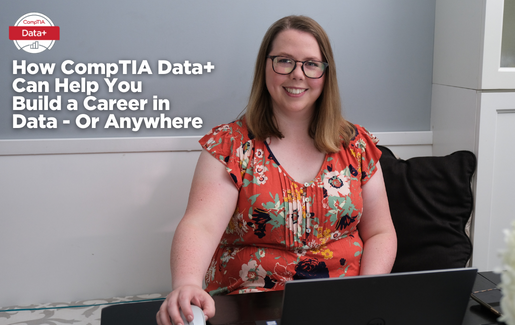 Analytics are everywhere. Global manufacturing enterprises pour over data to determine the most effective shipping routes, streamline supply chains and improve production. Retailers big and small use analytics to make sure the right products make it to the shelves for customers. Marketers use analytics to hone and target ad campaigns. Even in cybersecurity, analytics have become a non-negotiable part of the profession. Every day, skilled cybersecurity professionals scrutinize data logs to determine abnormal activity on networks and identify, shut down and remediate cyberattacks. The whole business world from the enterprise level on down is analyzing masses of data to do what they do better, faster and more securely. For 15 years, Jen Hood has been helping organizations understand and take action based on the data in front of them.
Analytics are everywhere. Global manufacturing enterprises pour over data to determine the most effective shipping routes, streamline supply chains and improve production. Retailers big and small use analytics to make sure the right products make it to the shelves for customers. Marketers use analytics to hone and target ad campaigns. Even in cybersecurity, analytics have become a non-negotiable part of the profession. Every day, skilled cybersecurity professionals scrutinize data logs to determine abnormal activity on networks and identify, shut down and remediate cyberattacks. The whole business world from the enterprise level on down is analyzing masses of data to do what they do better, faster and more securely. For 15 years, Jen Hood has been helping organizations understand and take action based on the data in front of them.
“Let's face it, we all have a limited amount of time,” Hood said. “We all, for the most part, have a really long list of things we'd like to do, and understanding your data better can make you really target what you focus on.”
Hood has worked in areas as disparate as large-scale manufacturing and micro-SMBs, and she has seen just how broadly analytics technology has been adopted and what a varied employment landscape it offers data-minded individuals.
“There are so many different niches within data analytics,” she said. “It's part of what I love about the field. At the heart of it, you're solving problems and working with data, but the tools you use can be radically different depending on the industry that you're in.”
A particular creative, problem-solving mindset combined with tool-agnostic expertise, then, is necessary to thrive in a data-related career. This is something CompTIA Data+ can help build and validate. In discussing what it takes to work in analytics, Hood discussed the certification’s advantages and admits she was skeptical at first.
CompTIA Data+: Getting to the Heart of Analytics
 Hood sees a lot of certifications in the marketplace, badges placed on LinkedIn touting the completion of a course and so on, that purport to confirm analytics capabilities. When she first heard about CompTIA Data+, she was skeptical. CompTIA has built its name over decades in IT, but it was not immediately clear to her that IT expertise would translate to the inter-departmental pursuit of analytics. Speaking with CompTIA and taking the exam, she was happy to find the same level of knowledge from around the industry to the exam objectives as it does to its other certifications in a way that made a lot of sense.
Hood sees a lot of certifications in the marketplace, badges placed on LinkedIn touting the completion of a course and so on, that purport to confirm analytics capabilities. When she first heard about CompTIA Data+, she was skeptical. CompTIA has built its name over decades in IT, but it was not immediately clear to her that IT expertise would translate to the inter-departmental pursuit of analytics. Speaking with CompTIA and taking the exam, she was happy to find the same level of knowledge from around the industry to the exam objectives as it does to its other certifications in a way that made a lot of sense.“I felt like it had good coverage of basic knowledge without being tool specific,” Hood said. “Regardless of what tool you use, you have to have a fundamental understanding of how to work with data, how to convey information and communicate around it, [which] are the fundamental building blocks [of] analytics. And that's where I see CompTIA Data+ fitting into the landscape. There's also fantastic training material, which I reviewed as part of that. It's all the types of things that I see day to day working in the analytics space.”
And so, she found that the promise CompTIA makes with its industry-standard IT certifications is on display with CompTIA Data+ as well.
“It is [CompTIA’s] reputation on the line,” Hood said. “If they say this person is qualified in this space, then an employer should expect that means something, that they have a set of skills.”
The Top Things To Know for a Career in Data
Drilling down further into what that skill set consists of and how best to leverage it, Hood shared some observations about steps beyond CompTIA Data+ that people can take to prepare themselves for an analytics career. First off, she advised aspiring data analysts to start with what they know.“A lot of people that are transitioning careers have a very natural pathway to go into analytics within a space where they already have great subject matter expertise,” Hood said. “What I recommend is don't try to boil the ocean. You don't need to learn everything at once.”
In fact, Hood pointed out that plenty of careers these days have a huge analytic component even if it’s not spelled out in the job title.
“[CompTIA Data+] can be really valuable whether or not you're actually in an analytics job,” Hood said. “Everybody works with data. So regardless of whether you're a data analyst or data scientist, maybe you're a manager, maybe you're an executive, having an understanding of data is really fundamental to being effective. And so, it's just one more tool in your arsenal to make you better at what you do, to make more informed decisions and to be more targeted in your actions.”
Just as decision-making is central to analytics, so is the ability to communicate decisions clearly to less technical departments. As in other areas of enterprise technology, speaking the language of business is a differentiator.
“I've had PhDs in statistics that have struggled to apply their knowledge,” Hood said. “They're clearly extremely skilled, but they can't solve the business problem. I've also had interns that are early in their college experience that have done fantastic as analysts because they've understood how to ask questions, how to understand what people need to interpret things and turn that into technical solutions. So, if people can close that gap, one of the biggest things you can do to set yourself apart from other candidates is being able to relate to the business and not just talk about technical skills.”
Helping Organizations Solve the Mysteries
Having closed that gap and distinguished herself in the profession, Hood continues to help organizations move with an increased degree of certainty that they are making the right choices. She does so while enjoying the personal fulfillment of being able to look at a complicated array of information and find the actionable thread hidden within.
“I feel really satisfied helping companies answer questions, turning data into insights and action,” Hood said. “It's like solving a little mystery and helping people find out what the clues lead to. That's really satisfying.”

And while data analytics is a technologically sophisticated pursuit, Hood finds that the mindset it takes to manage it is one that is very applicable in other areas, in a way that could give people with limited tech experience who are eyeing career changes some ideas about how they can get an analytics career cooking.
“I like that baking is kind of like data analytics in a way,” Hood said. “You have this structure, you have this outline to follow, sort of a math recipe. You have your ratios, but then you pick where you want to go from there. I can make a brownie recipe and I can just do a box brownie. I can make brownies from scratch or I can do something in the middle that still feels like I have creative input. I can throw a few chocolate chips in, I can add some sea salt or bump up the vanilla. I get to be a little creative with it.”
Get the in-demand skills you need with CompTIA certifications and training solutions. Download the CompTIA Data+ exam objectives to get started.
Matthew Stern is a freelance writer based in Chicago who covers information technology, retail and various other topics and industries

